Automobiles
Hyundai's woes: Too many cars rolling out of Korean plants
Hyundai Motor’s heavy reliance on domestic factories is out of sync with the worldwide trend of glocalization
By Jun 21, 2022 (Gmt+09:00)
5
Min read
Most Read
LG Chem to sell water filter business to Glenwood PE for $692 million


Kyobo Life poised to buy Japan’s SBI Group-owned savings bank


KT&G eyes overseas M&A after rejecting activist fund's offer


StockX in merger talks with Naver’s online reseller Kream


Mirae Asset to be named Korea Post’s core real estate fund operator


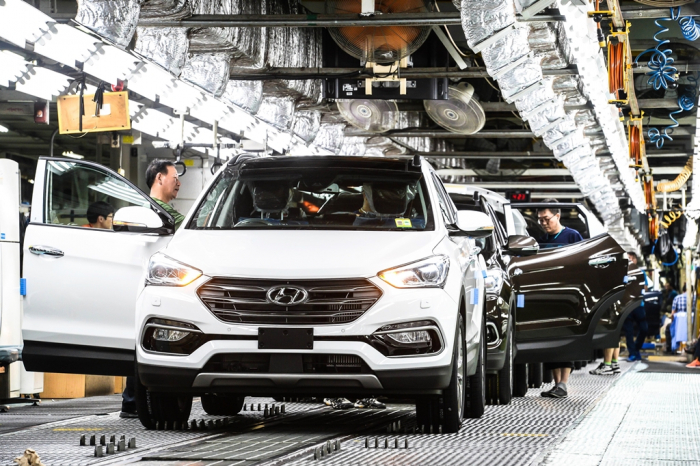
The eight-day South Korean truck drivers’ strike that ended last week has laid bare one long-standing but often ignored problem at the country’s top automaker: too many cars coming out of its local plants.
The unionized truckers’ nationwide walkout has crippled production at Hyundai Motor Co. and affiliate Kia Corp., with their local plant operating rate falling to half their usual level as the timely supply of needed components was paralyzed.
The walkout incurred losses amounting to 5,000 cars in lost production for Kia and 10,000 units for Hyundai. Hyundai’s unionized workers, notorious for their belligerent hardline labor action, didn’t participate in the strike but threw their support behind the trucker move.
If the strike lasted for another week, it would have impaired the carmakers’ second-quarter earnings, industry watchers said.
Labor strife is not uncommon across industries and around the world.
However, Hyundai’s heavy reliance on local factories would place the ambitious carmaker at a disadvantage vis-à-vis multinational peers in churning out cars where the highest levels of productivity and efficiency are guaranteed, analysts said.
“Establishing a regional value chain to manufacture cars where they are sold is the trend. It’s particularly so when protectionism is growing wild,” said Lee Hang-koo, a researcher at the Korea Automotive Technology Institute.
“Hyundai may be out of sync in that regard.”
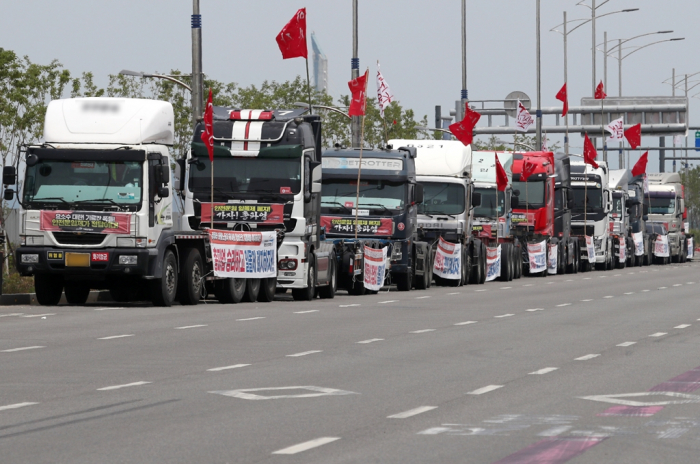
TRADE PROTECTIONISM
According to a recent survey of 10 automakers by the Korea Automobile Manufacturers Association (KAMA) and The Korea Economic Daily, Hyundai Motor ranked first in the proportion of local plants out of total car production at 47.9%.
That compared with Volkswagen AG’s 14.1%, Renault-Nissan’s 20.9%, General Motors Co.’s 26.2% and Toyota Motor Corp.’s 26.5%.
Over the past five years, global automakers have steadily reduced their dependence on their home turf while Hyundai has gone the other way.
Toyota and Volkswagen slashed their production in their home countries by 6.2 percentage points each over the 2017-2021 period. By contrast, Hyundai Motor’s local production increased by 3.9 percentage points in the corresponding period, giving in to demand from its workers and politicians who called for more local production to create jobs.
Volkswagen currently operates 122 factories across 31 nations, while GM runs 56 plants in 23 countries. Hyundai Motor and Kia own a combined 15 factories in 10 countries.
“A business strategy focused on exports after producing in Korea is increasingly becoming less effective and less efficient,” said KAMA Chairman Jung Man-ki.
“Advancing into the markets where local production ensures incentives and hiring local talent is easier is the way to go for Korean carmakers.”
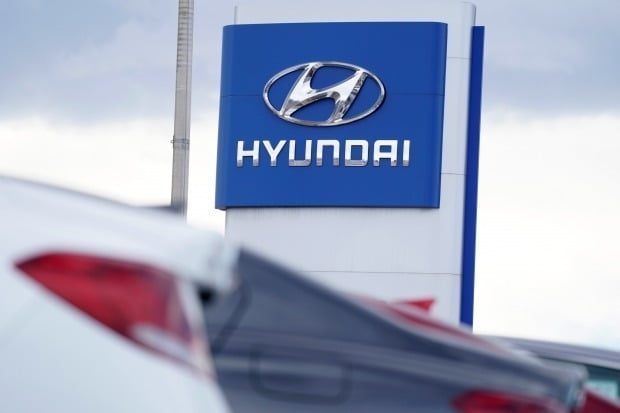
ALABAMA VS ULSAN
A higher proportion of Korean production won’t be a problem as long as it can translate into higher productivity and increased earnings, experts say.
According to a January report by automotive consulting firm Oliver Wyman, Hyundai’s US manufacturing plant in Montgomery, Alabama was the world’s second-most productive assembly plant after Peugeot’s Sochaux plant in France, contributing to Hyundai’s record North American sales last year.
Among car assembly plants in North America, Hyundai Motor Manufacturing Alabama LLC (HMMA) has been the most productive since 2016.
At HMMA, it took 24.02 hours to fully assemble a vehicle, more productive than 28.71 hours at GM’s Fairfax plant, 29.99 hours at GM’s Lansing Delta assembly plant, and 31.92 hours at Toyota’s Georgetown plant, according to the consulting firm.
Hyundai’s US plant is even more productive than its main Korean manufacturing plant in Ulsan.
Its Alabama factory produces 68 cars an hour, compared with 45 cars at Hyundai’s Ulsan plant.
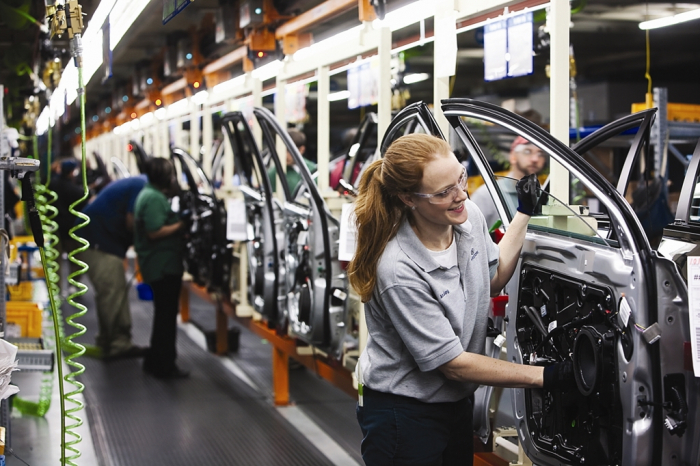
PROFITABILITY
Improved productivity often frees up money that can be plowed back into vehicle development and elevated profitability.
Hyundai Motor Group’s two automaking units posted an operating profit margin of 6.3% last year, much lower than Toyota’s 10.4% and a margin of 10.1% for Stellantis A.V.
The Korean duo’s combined profit margin inched up to 7.3% in the first quarter of this year, when their rivals mostly posted double-digit figures with Volkswagen boasting 13.5% and GM at 10.4%.
Industry pundits said Hyundai needs to either improve its Ulsan plant productivity or produce more cars overseas to remain competitive.
In the first three months of the year, the US market accounted for 22% of Hyundai’s global sales, but its US plants took up a relatively smaller portion at 9.3%.
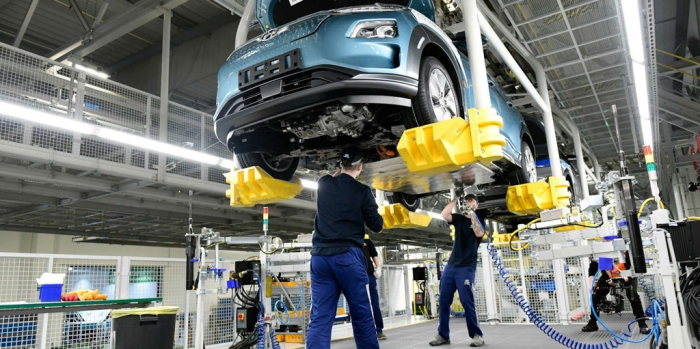
With some 3,100 workers and an annual production capacity of 370,000 cars, the plant assembles Sonata and Elantra sedans, Santa Fe and Tucson SUVs, and the Santa Cruz Sport Adventure Vehicle.
Hyundai Motor has said it aims to turn the Alabama plant into the main production base for electric vehicles in the US.
The carmaker has been striving to improve productivity at its Korean plants too.
Hyundai said in March it plans to introduce a multiple vehicle assembly system at its main plant in Korea to meet the demand for diverse models.
The company said it will adopt a multi-product batch system at its third Ulsan factor in August and then roll out more such systems at other local plants later.
Such a system has already been deployed at Hyundai’s overseas plants, including those in the US, China and Brazil.
However, the company hasn’t introduced the system to Korean plants largely due to objections from its labor union, which says making several cars on one production line will add to their workload and could eventually result in fewer assembly lines and deeper job cuts.
“If you don’t expand facilities where you can make cars most efficiently, it could boomerang back and cost your job at home,” said an industry official.
Write to Il-Gue Kim, Han-Shin Park and Hyung-Kyu Kim at Black0419@hankyung.com
In-Soo Nam edited this article.
More to Read
-
 Electric vehiclesHyundai to build EVs at US plant; Electrified GV70 to roll out in Dec.
Electric vehiclesHyundai to build EVs at US plant; Electrified GV70 to roll out in Dec.Apr 13, 2022 (Gmt+09:00)
3 Min read -
 AutomobilesHyundai to adopt multiple car assembly system at local plant from August
AutomobilesHyundai to adopt multiple car assembly system at local plant from AugustMar 23, 2022 (Gmt+09:00)
3 Min read -

-
 AutomobilesHyundai Motor’s Alabama plant: World’s second most productive
AutomobilesHyundai Motor’s Alabama plant: World’s second most productiveJan 11, 2022 (Gmt+09:00)
2 Min read -
 AutomobilesHyundai Motor, Kia overtake Ford in US auto sales in May
AutomobilesHyundai Motor, Kia overtake Ford in US auto sales in MayJun 09, 2021 (Gmt+09:00)
2 Min read -
 Future mobilityHyundai Motor to make EVs in US with $7.4 bn investment by 2025
Future mobilityHyundai Motor to make EVs in US with $7.4 bn investment by 2025May 14, 2021 (Gmt+09:00)
3 Min read
Comment 0
LOG IN


